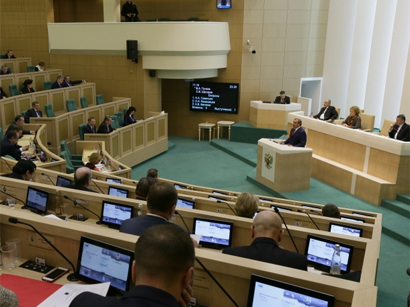The Committee on International Relations of the Federation Council, the upper house of Russian parliament, on Saturday, March 1, supported President Vladimir Putin's appeal regarding the use of the Russian Armed Forces in Ukraine pending normalisation of the situation in the neighbouring country, ITAR-TASS reported.
The Federation Council Committee on Security also supported the president's appeal. Both committees advised the upper house to uphold it, Security Committee Chair Viktor Ozerov and International Relation Committee Chair Vladimir Dzhabarov said.
The Federation Council was summoned for an urgent meeting on Saturday to discuss Putin's letter.
"In connection with the extraordinary situation in Ukraine, the threat to the lives of citizens of the Russian Federation, our compatriots, the personnel of the military contingent of the Armed Forces of the Russian Federation deployed in the territory of Ukraine (Autonomous Republic of Crimea) in accordance with an international treaty, and pursuant to Article 102-1(d) of the Constitution of the Russian Federation, I hereby submit to the Federation Council of the Federal Assembly of the Russian Federation a letter on the use of the Armed Forces of the Russian Federation in the territory of Ukraine pending normalisation of the social and political situation in that country," the president said in his letter to the Federation Council.
Earlier in the day, the Federation Council asked Putin to take "exhaustive measures" to protect Russians in Ukraine.
"We have urgently summoned the house Council and thought it necessary to make a statement assessing the current situation in Ukraine," Federation Council Chairperson Valentina Matviyenko said.
"Today there is a real threat to the life and security of Russian citizens living in Ukraine. There is a threat to our military in Sevastopol and the Black Sea Fleet, and I think that Russia should not be a bystander," she said.
The main purpose of the Federation Council's appeal to the president is to urge him "to take exhaustive measures, all possible measures, to ensure the security of our citizens living in Ukraine, help our brotherly Ukrainian people achieve stabilisation and channel the current crisis into a civilised legal track so that the agreements that were signed by the opposition leaders and the head of state were implemented strictly," Matviyenko said.
She noted that members of the Federation Council "asked the president to take exhaustive measures to prevent further escalation and put the resolution of the political crisis onto a legal track so that those who have grabbed power did not hurry so much and did not trample upon the rights of people and different regions of Ukraine."
In accordance with Article 102-1(d) of the Russian Constitution, issues concerning the use of the Russian Armed Forces outside the country fall under the jurisdiction of the Federation Council, which considers them following the relevant request from the president.
The Federation Council debates such issues after studying the president's request which should contain sound reasons for his proposal.
The Federation Council chair then sends the request to the upper house's committee on defence and security and committee on international relations, which prepare their conclusions.
After that the Federation Council studies the possibility of using the Russian Armed Forces outside the country at its nearest sitting after receipt of the president's request. The president and the prime minister are invited to attend the sitting which begins with a report delivered by the president himself or his representative, followed by the reading of the conclusions made by the Federation Council committees on defence and security and on international relations.
A decision allowing the use of the Russian Armed Forces outside the country is to be adopted by a majority of Federation Council members and is then formalised in a resolution of the upper house. The document is forwarded to the president within two days of its adoption.






